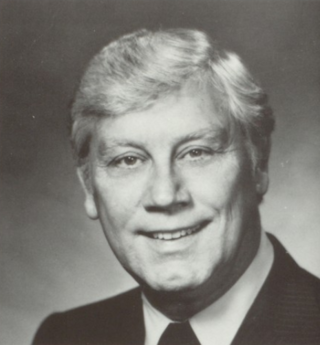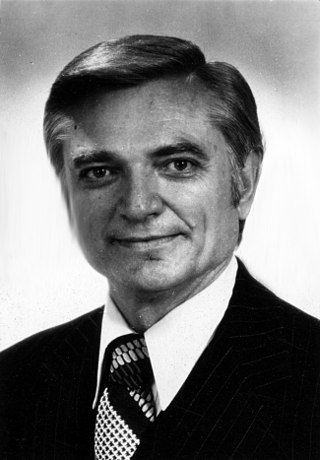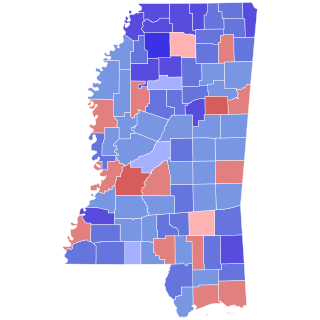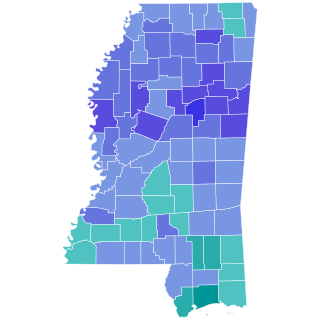
William A. Allain was an American politician and lawyer who held office as the 59th governor of Mississippi as a Democrat from 1984 to 1988. Born in Adams County, Mississippi, he attended the University of Notre Dame and received a law degree from the University of Mississippi School of Law in 1948.

Charles Clifton Finch was an American politician who served as the 57th governor of Mississippi from 1976 to 1980.

The 1999 Mississippi gubernatorial election took place on November 2, 1999 to elect the Governor of Mississippi. Incumbent Governor Kirk Fordice, a member of the Republican Party who had been first elected in 1991, was ineligible to run for reelection due to term limits.

The 1991 Mississippi gubernatorial election took place on November 5, 1991 to elect the Governor of Mississippi. Incumbent Democrat Ray Mabus unsuccessfully ran for reelection to a second term. This election marked the first time a Republican was elected Governor of Mississippi since Reconstruction, when Adelbert Ames won the office in 1873.

The 1987 Mississippi gubernatorial election took place on November 3, 1987 to elect the governor of Mississippi.

The 1979 Mississippi gubernatorial election took place on November 6, 1979, in order to elect the Governor of Mississippi. Incumbent Democrat Cliff Finch was term-limited, and could not run for reelection to a second term. As of 2020, this was the most recent election in which a Democrat won over 60 percent of the statewide vote in a gubernatorial election in the state.

The 1975 Mississippi gubernatorial election took place on November 5, 1975, in order to elect the Governor of Mississippi. Incumbent Democrat Bill Waller was term-limited, and could not run for reelection to a second term. To date, this was the last time Washington County voted for the Republican candidate.

The 1959 Mississippi gubernatorial election took place on November 3, 1959, in order to elect the Governor of Mississippi. Incumbent Democrat James P. Coleman was term-limited, and could not run for reelection to a second term. As was common at the time, the Democratic candidate ran unopposed in the general election; therefore, the Democratic primary was the real contest, and winning the primary was considered tantamount to election.

The 1955 Mississippi gubernatorial election took place on November 8, 1955, in order to elect the Governor of Mississippi. Incumbent Democrat Hugh L. White was term-limited, and could not run for reelection to a second term. As was common at the time, the Democratic candidate ran unopposed in the general election, so therefore the Democratic primary was the real contest, and winning the primary was considered tantamount to election. This election was the first Mississippi gubernatorial election since 1931 that the winner of the gubernatorial election was of a different party than the incumbent president.

The 1951 Mississippi gubernatorial election took place on November 6, 1951, in order to elect the Governor of Mississippi. Incumbent Democrat Fielding L. Wright was term-limited, and could not run for reelection to a second full term. As was common at the time, the Democratic candidate ran unopposed in the general election; therefore the Democratic primary was the real contest, and winning the primary was considered tantamount to election.

The 1947 Mississippi gubernatorial election took place on November 4, 1947, to elect the governor of Mississippi. Incumbent Democrat Fielding L. Wright, who had succeeded to the governorship a year prior following the death of Thomas L. Bailey, ran for election to a first full term.

The 1943 Mississippi gubernatorial election took place on November 2, 1943 to elect the Governor of Mississippi. Incumbent Democrat Paul B. Johnson Sr. was term-limited, and could not run for reelection to a second term. As was common at the time, the Democratic candidate ran unopposed in the general election so therefore the Democratic primary was the real contest, and winning the primary was considered tantamount to election.

The 1939 Mississippi gubernatorial election took place on November 7, 1939, in order to elect the Governor of Mississippi. Incumbent Democrat Hugh L. White was term-limited, and could not run for reelection to a second term. As was common at the time, the Democratic candidate ran unopposed in the general election so therefore the Democratic primary was the real contest, and winning the primary was considered tantamount to election.

The 1935 Mississippi gubernatorial election took place on November 5, 1935, in order to elect the Governor of Mississippi. Incumbent Democrat Martin S. Conner was term-limited, and could not run for reelection to a second term. As was common at the time, the Democratic candidate ran unopposed in the general election; therefore, the Democratic primary was the real contest, and winning the primary was considered tantamount to election.

The 1931 Mississippi gubernatorial election took place on November 3, 1931, in order to elect the Governor of Mississippi. Incumbent Democrat Theodore G. Bilbo was term-limited, and could not run for reelection to a second term. As was common at the time, the Democratic candidate ran unopposed in the general election, so therefore the Democratic primary was the real contest, and winning the primary was considered tantamount to election.

The 1927 Mississippi gubernatorial election took place on November 8, 1927, in order to elect the Governor of Mississippi. Incumbent Democrat Dennis Murphree, as he had not served a full term, was eligible for and ran for election. As was common at the time, the Democratic candidate ran unopposed in the general election; therefore the Democratic primary was the real contest, and winning the primary was considered tantamount to election.

The 1923 Mississippi gubernatorial election took place on November 6, 1923, in order to elect the Governor of Mississippi. Incumbent Democrat Lee M. Russell was term-limited, and could not run for reelection to a second term. As was common at the time, the Democratic candidate ran unopposed in the general election so therefore the Democratic primary was the real contest, and winning the primary was considered tantamount to election.

The 1903 Mississippi gubernatorial election took place on November 3, 1903, in order to elect the Governor of Mississippi. Incumbent Democrat Andrew H. Longino was term-limited, and could not run for reelection to a second term.

Gilbert Ellzey Carmichael was an American businessman and politician. Born in Columbia, Mississippi, he attended Texas A&M University and served in the United States Coast Guard during the Korean War, earning a Silver Lifesaving Medal for helping rescue crewmen from a sinking tanker. In June 1950 Carmichael was hired by the Dow Jones & Company to sell its newspaper, The Wall Street Journal. After eight years, he joined a friend in distributing cars in Shreveport, Louisiana. He later became a partner in a car dealership in Meridian, Mississippi, before taking over the business. A member of the Republican Party, he became involved in politics in the 1960s, making two unsuccessful bids for a seat in the Mississippi State Legislature. Carmichael also ran for a U.S. Senate seat in 1972 and in 1975 ran for the office of Governor of Mississippi, the first serious Republican contender for the post in decades. He lost a narrow race and made another unsuccessful bid in 1979. He also launched an unsuccessful independent campaign in 1983 to be elected Lieutenant Governor of Mississippi. From the 1970s to the 1990s he served on various national transportation advisory boards. He died in 2016.
Leon Crow Bramlett Jr. was an American farmer, football player, and politician. Born in Clarksdale, Mississippi, he briefly played football at the University of Mississippi and the University of Alabama before being admitted to the U.S. Naval Academy, where he played from 1943 to 1947. He briefly worked as an end coach for the team while serving in the United States Marine Corps before returning to Clarksdale to farm cotton. He served on the Mississippi Marketing Council and chaired the Mississippi Democratic Party from 1968 to 1972, during a time when the party was split between conservative "Regulars", including Bramlett, and pro-civil rights "Loyalists". In 1976 the Regulars and the Loyalists reached a compromise and in response Bramlett joined the Republican Party. He lost the 1979 Republican gubernatorial primary in Mississippi but secured the nomination four years later before losing in the general election. He retired from farming in 2001 and served on U.S. Senator Thad Cochran's staff for several years, dying in 2015.






















